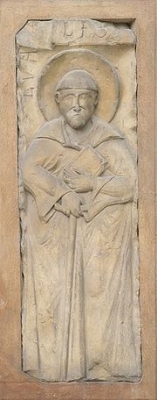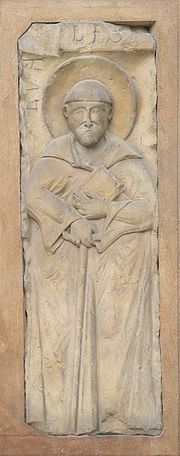
Blessed Gunther
Encyclopedia

Beatification
Beatification is a recognition accorded by the Catholic Church of a dead person's entrance into Heaven and capacity to intercede on behalf of individuals who pray in his or her name . Beatification is the third of the four steps in the canonization process...
Gunther was a Catholic
Catholic
The word catholic comes from the Greek phrase , meaning "on the whole," "according to the whole" or "in general", and is a combination of the Greek words meaning "about" and meaning "whole"...
hermit
Hermit
A hermit is a person who lives, to some degree, in seclusion from society.In Christianity, the term was originally applied to a Christian who lives the eremitic life out of a religious conviction, namely the Desert Theology of the Old Testament .In the...
in Bohemia
Bohemia
Bohemia is a historical region in central Europe, occupying the western two-thirds of the traditional Czech Lands. It is located in the contemporary Czech Republic with its capital in Prague...
in the eleventh century.
Biography
Gunther was born about 955. The son of a noble family, he was a brother-in-law of St. Stephen, the King of HungaryKing of Hungary
The King of Hungary was the head of state of the Kingdom of Hungary from 1000 to 1918.The style of title "Apostolic King" was confirmed by Pope Clement XIII in 1758 and used afterwards by all the Kings of Hungary, so after this date the kings are referred to as "Apostolic King of...
, and is numbered among the ancestors of the princely house of Schwarzburg
House of Schwarzburg
The House of Schwarzburg was one of the oldest noble families of Thuringia, until its extinction in 1971 with the death of Prince Friedrich Günther...
. He passed the early part of his life at court in the midst of worldly pleasures and ambitious intrigues.
He was converted in 1005 at the age of fifty by St. Gotthard
Gotthard of Hildesheim
Saint Gotthard , also known as Gothard or Godehard the Bishop, is a Roman Catholic saint.-Life:...
, Abbot of Hersfeld, later Bishop of Hildesheim, and resolved to embrace the monastic life in order to do penance for his past faults. With the consent of his heirs, he bequeathed all his goods to the Abbey of Hersfeld, reserving the right to richly endow and maintain the monastery of Göllingen
Göllingen
Göllingen is a municipality in the district Kyffhäuserkreis, in Thuringia, Germany....
, the ownership of which he persisted in retaining despite all the efforts of St. Gotthard to prevent him. In 1006, the novice made a pilgrimage to Rome, and in the following year made his vows as lay brother in the monastery of Niederaltaich
Niederaltaich Abbey
Niederaltaich Abbey or Niederaltaich Monastery is a house of the Benedictine Order founded in 731 , situated in the village of Niederalteich on the Danube in Bavaria....
before the holy Abbot Gotthard.
Soon afterwards, Gunther urgently entreated to be allowed to govern his monastery of Göllingen, and St. Gotthard's remonstrances could not turn him aside from his purpose. Shortly after his elevation to the abbacy
Abbot
The word abbot, meaning father, is a title given to the head of a monastery in various traditions, including Christianity. The office may also be given as an honorary title to a clergyman who is not actually the head of a monastery...
, the former lay brother fell ill, and as he could not agree with his monk
Monk
A monk is a person who practices religious asceticism, living either alone or with any number of monks, while always maintaining some degree of physical separation from those not sharing the same purpose...
s, the affairs of the monastery
Monastery
Monastery denotes the building, or complex of buildings, that houses a room reserved for prayer as well as the domestic quarters and workplace of monastics, whether monks or nuns, and whether living in community or alone .Monasteries may vary greatly in size – a small dwelling accommodating only...
were soon in a perilous condition. By his charitable counsels mingled with severe reprimands, St. Gotthard succeeded in dispelling the ambitious views of Gunther, who returned once more to his humble condition at Niederaltaich, and led an edifying life.
In 1008, he withdrew to a wild, steep place near Lalling
Lalling
Lalling is a municipality in the district of Deggendorf in Bavaria in Germany....
, to live as a hermit. In 1011, he penetrated farther north in the forest with several companions and settled at Rinchnach
Rinchnach
Rinchnach is a municipality in the district of Regen, in Bavaria, Germany....
, where he built cells and a church of St. John Baptist. Here he lived for thirty-four years a life of the greatest poverty
Poverty
Poverty is the lack of a certain amount of material possessions or money. Absolute poverty or destitution is inability to afford basic human needs, which commonly includes clean and fresh water, nutrition, health care, education, clothing and shelter. About 1.7 billion people are estimated to live...
and mortification
Mortification of the flesh
Mortification of the flesh literally means "putting the flesh to death". The term is primarily used in religious and spiritual contexts. The institutional and traditional terminology of this practice in Catholicism is corporal mortification....
. The very water was measured out to the brothers, guests alone being free to use at as they would. Although he had never learned more than the psalter
Psalter
A psalter is a volume containing the Book of Psalms, often with other devotional material bound in as well, such as a liturgical calendar and litany of the Saints. Until the later medieval emergence of the book of hours, psalters were the books most widely owned by wealthy lay persons and were...
, Gunther received from God
God
God is the English name given to a singular being in theistic and deistic religions who is either the sole deity in monotheism, or a single deity in polytheism....
, in reward for his excessive auserities, profound knowledge of the Holy Scripture and edified by his teaching all who came to visit him. Wolfher, his biographer, relates that he knew him intimately, and often heard his admirable sermons on his patron, St John the Baptist—sermons which drew tears from all who heard them.
The holy hermit paid many visits to his relative the King of Hungary, obtained from him large sums for the poor, and urged him to build a number of churches and monasteries. Mabillon has reproduced the deed of donation made by King Stephen on 6 June 1009. In 1029 Conrad II
Conrad II, Holy Roman Emperor
Conrad II was Holy Roman Emperor from 1027 until his death.The son of a mid-level nobleman in Franconia, Count Henry of Speyer and Adelaide of Alsace, he inherited the titles of count of Speyer and of Worms as an infant when Henry died at age twenty...
richly endowed the monastery of Rinchnach, and in 1040 Emperor Henry III affiliated it with Niederaltaich Abbey
Niederaltaich Abbey
Niederaltaich Abbey or Niederaltaich Monastery is a house of the Benedictine Order founded in 731 , situated in the village of Niederalteich on the Danube in Bavaria....
.
Gunther died at Hartmanice
Hartmanice (Klatovy District)
Hartmanice is a town in the Czech Republic.-External links:***...
, Bohemia, on 9 October 1045, in the arms of Duke Bretislaus of Bohemia and of the Bishop
Bishop
A bishop is an ordained or consecrated member of the Christian clergy who is generally entrusted with a position of authority and oversight. Within the Catholic Church, Eastern Orthodox, Oriental Orthodox Churches, in the Assyrian Church of the East, in the Independent Catholic Churches, and in the...
of Prague
Prague
Prague is the capital and largest city of the Czech Republic. Situated in the north-west of the country on the Vltava river, the city is home to about 1.3 million people, while its metropolitan area is estimated to have a population of over 2.3 million...
. He was buried in Brevnov Monastery but his remains were destroyed by the Hussites in 1420.

